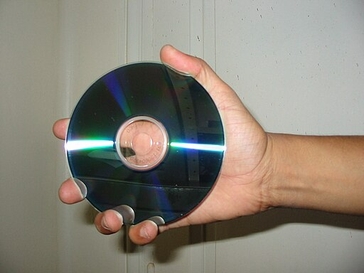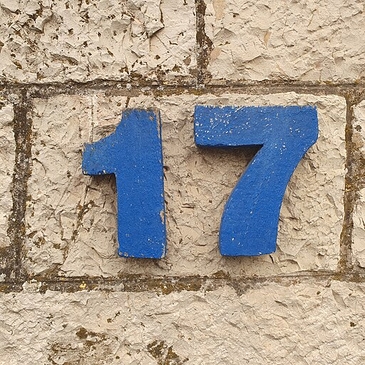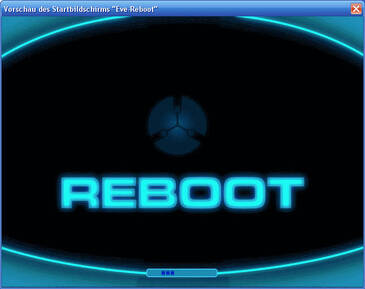The Checker Maven
The World's Most Widely Read Checkers and Draughts Publication
Bob Newell, Editor-in-Chief
Published every Saturday morning in Honolulu, Hawai`i
Noticing missing images? An explanation is here.
Joe Schwartz Reflects on Checkers Experiences
A Guest Column by Dr. Richard Beckwith
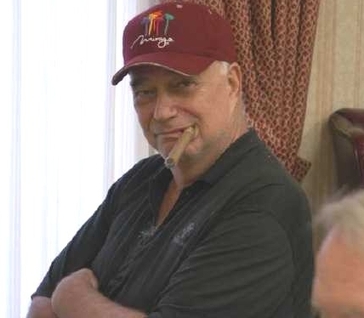
Joe Schwartz (circa 2003)
Joe Schwartz has been on the checker scene for decades. In addition to always having plenty of stories to tell, Joe interacted with many of the checker greats of the past. For example, Joe's father even once arranged a checker lesson for Joe from the great Willie Ryan, who was from Bronx, NY at the time. Mr. Ryan explained to a young Joe why certain moves were made in various openings. Willie Ryan had come down for a day to put on an exhibition at the YMCA. Joe has a picture of this day (with him in it) hanging in his home. Men typically wore suits and neckties in those days.
In the 8th International Match Book, Joe mentioned one of his biggest thrills was winning his first tournament as a teenager in Poughkeepsie, NY, the city where Joe was born. There were about 30 players, and Joe was the youngest. Joe only played GAYP back in those days, as there wasn't any three-move restriction activity around him until later in life.
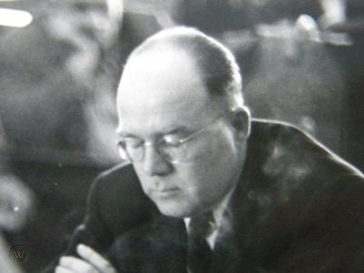
Tom Wiswell
Tom Wiswell lived in Brooklyn. Wiswell came to an exhibition for chess and checkers, where Joe got a book from him. Joe last saw Wiswell at central Park. Tom Wiswell once commented to Joe that the checker position looks different if you get up from your chair and go look at the board from the other side. Joe also mentioned that New York City had a checkers academy on 42nd street where good players met to play for money.

Richard Hallett
A checker friend Bill Wallace was with Joe during a Florida break and took Joe to a park, some 50 years ago. This is where Joe encountered Richard Hallett again. (Mr. Hallett also lived in Poughkeepsie, NY and fed Joe's cat whenever Joe was away. Later in life, Richard lived in Joe's Florida residence high-rise building.) The three players drove together to the St. Petersburg tournament, where Joe first met Marion Tinsley. Joe asked Tinsley his opinion of what is the better defensive move in the Switcher: 30-25 or 17-14 (from the run-up of 11-15 21-17 9-13 25-21 8-11 and now white to play). Tinsley replied, "30-25 is the better move."
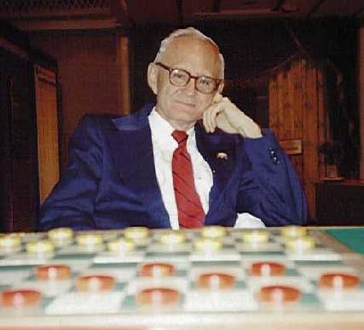
Marion Tinsley
Joe Schwartz moved to Florida in 1991, living with Bill Wallace a few months before locating to Hallandale, Florida (still his place of residence today). Joe's tradition of housing visiting checker players for the night goes back to his New York days, where he hosted the likes of Norm Wexler, Ed Bruch and Harold Freyer. Over the years, Joe sponsored matches between Richard Hallett with both Derek Oldbury and with Elbert Lowder, putting up Lowder and Oldbury (in wheelchair) for the match duration. Joe recalls Derek Oldbury being a very intellectual man who liked classical music, but was not into watching television. His wife Joan was also in a wheelchair.
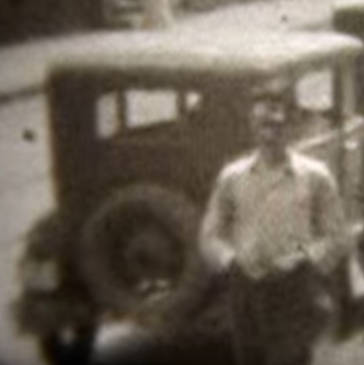
Harold Freyer
Harold Freyer once lost a game to Bill Levine at a tournament in Joe's home. In the second game, Freyer eagerly sought revenge and had Levine in a troublesome ending. Mr. Freyer suggested to his opponent that he resign the position in view of the caliber of his opponent. Bill Levine grabbed a pencil, pointed it at Harold, and said, "I have a right to play this game out." Harold snatched the pencil out of his hand. Tempers started to flare, and Joe had to come over to diffuse the situation. Harold shot back at Joe, "I've been thrown out of better houses than yours!"
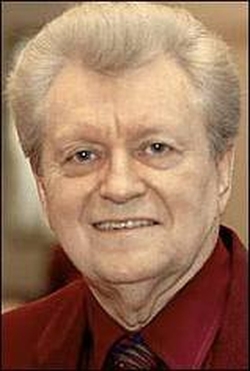
Charles Walker
Joe recalls two other incidents that led to checkers flying off the board. One was Al DuBois vs. Charles Walker. After some apparent ribbing, Mr. Dubois threw the checkers, one of which hit Mr. Walker's wife around the eye and required medical attention. The other was the last game of the National Tournament between Elbert Lowder and Ron King. Elbert appeared to have the tournament won with an apparent even ending on the last game of the tournament that most players would quickly call a draw. But Suki, needing a win, wanted to play the position out further. After some fast moving, Elbert allowed a trade that allowed his remaining pieces to get trapped with the move, which resulted in checkers flying across the table. A position on a nearby non-Master game was disturbed, and they weren't recording their moves to allow reconstruction of their position.
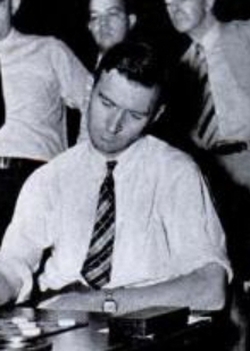
Asa Long
In additional to having several lunches with Marion Tinsley, Joe had dinner with Asa Long ("a very humble man") and even helped take Mr. Long to the hospital after his health issue that occurred shortly after the start of the 1988 U.S. National in Danville, Virginia.
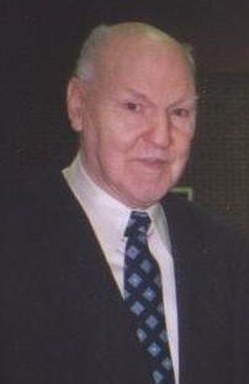
Elbert Lowder
One time Joe Schwartz was playing Elbert Lowder in a tournament on a Single Corner opening. Joe encountered some difficulty with his current game and remarked to Elbert, "I wish I had time to analyze this position." Mr. Lowder proceeded to grab the analog time clock and wound it back to give Joe an additional 30 minutes! Joe concluded the story with, "Lowder beat me anyway."
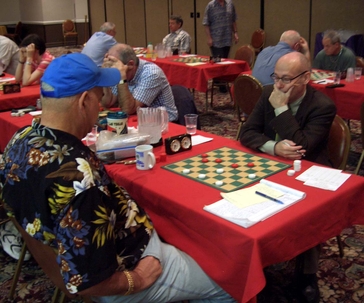
Dave Harwood and Joe Schwartz
2005 USA-UK/Ireland Match
So, what was Joe's other greatest checker thrill? It occurred in one of Joe's favorite cities to visit --- Las Vegas. This personal achievement came at the 2005 USA-U.K. & Ireland International Match held in Las Vegas, where Joe had the best record of anyone present with 10 wins, no losses and 10 draws.
BLACK
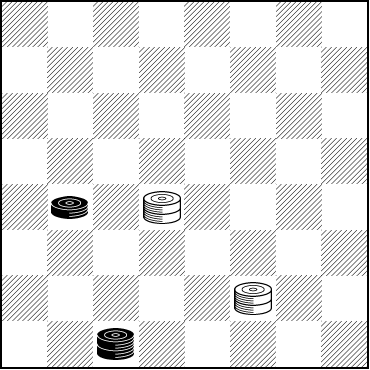
WHITE
White to Play and Win
W:WK18,K27:B17,K30
In addition, here's a problem position arising from one of Joe's games in the aforementioned 2005 match.
Game from 2005 USA vs. U.K & Ireland 8th International Match, Las Vegas
Black: Joe Schwartz
White: Garrett Owens
11-15 21-17 8-11 17-13 9-14 25-21 11-16 29-25 16-20 24-19 15x24 28x19 4-8 22-17 14-18 23x14 8-11 26-23 11-15 25-22 15x24 22-18---A,B 24-28 (see diagram below).
A---While this move does draw, 30-25 is the computer's choice.
B---32-28 loses. Try it out!
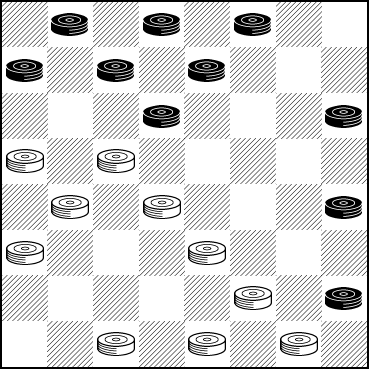
WHITE
White to Play and Draw
W:W13,14,17,18,21,23,27,30,31,32:B1,2,3,5,6,7,10,12,20,28
As always, you can click on Read More to check your solutions to these problems.
The Checker Maven extends its warmest thanks to Richard Beckwith for providing us with this fascinating article.
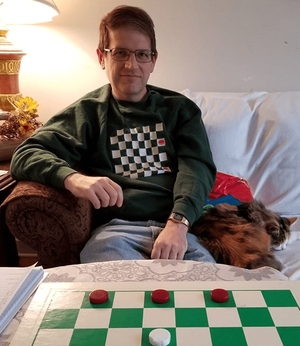
Dr. Richard Beckwith
![]()
You can email the Webmaster with your comments on this article.
Arizona Checkers: Ryan Pronk

Ryan Pronk
With permission
Today The Checker Maven has the pleasure of presenting an in-depth interview with a relatively young checker master, Ryan Pronk. Ryan is not only known for his playing prowess; he's created over 100 high-quality checker videos in his AZ Checkers series, which can be found on Ryan's YouTube channel. The videos present instructional material as well as analysis of games both historical and contemporary.
CM: At what age did you start playing checkers? What got you interested in the game?
RP: I started playing checkers seriously at the age of 14. Prior to that, I often played chess with my friends, who were involved in Scholastic tournaments. I was drawn to the competitive nature of it all, and that carried over easily to checkers. I found out about checkers thanks to a Hoyle Board Games CD-ROM gift a neighbor had given me.
I played all of the games on that disk, including Chess, Checkers, Othello, Backgammon, Mancala, etc. I found myself defeating the checkers computer opponent on expert level repeatedly, so I thought there might be something to this! In hindsight, I wasn't playing too terribly for an extreme novice, often developing 11-15, 7-11, 3-7 every game when handling the first side.
CM: Did you ever expect to become a top-tier player? How many hours of study do you suppose you've done?
RP: I always wanted to compete against and be on par with today's masters. It wasn't until finishing runner-up in the 2007 Tennessee Masters (arguably my best result), did I really feel confident that I can compete and that I belong in the same field as some of the best players in the country.
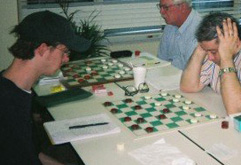
With permission
Being invited to play on the International Team is easily the highest honor I have achieved, and it showed that my peers hold my ability in high regard--- and that is something I will never forget! I would study for two to three hours every night throughout high school, and a little bit less through college, and unfortunately even less now. I still do enjoy studying when I can, specifically endgame positions or lines of opening play.
CM: Any tips for the aspiring newcomer to the game?
RP: Always have fun when playing the game! Winning is great, and losing is not so great. It may feel like a rollercoaster at times. But keep at it, and continue to enjoy the game. Even the best players in the world today lose from time to time! Trust your intuition as you'll know if and when it's time to look up how to win a 2 kings vs. 1 king ending, or avoid being triple jumped. From there, your interest in other facets of the game might grow! In the interim, just have fun!
CM: Do you have a favorite checker book?
RP: I really enjoy anything by Richard Pask and Richard Fortman--- both have been tremendous inspirations to me. Solid Checkers and Basic Checkers are still my go-to books, along with Kear's Encyclopedia.
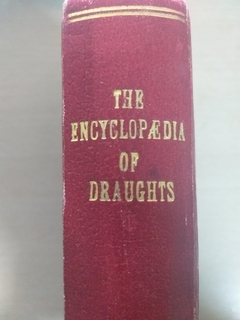
With permission
I also enjoy world title match compilation books, and Willie Ryan's writings (his Modern Encyclopedia, specifically).
CM: What's your background and your interests aside from checkers? Where are you originally from?
RP: I grew up in Minnesota and went to college and started my career in Arizona --- so one weather extreme to the other! I've lived in Virginia for more than a decade now; it's certainly a happy medium weather-wise! I've always had an interest in journalism, and spent more than six years in the industry as a reporter, copy editor, and page designer. The AZ Checkers YouTube channel allows me to combine my interests and hobbies all into one, as there's a good amount of writing, editing/video editing, and checkers involved!
CM: What led you to start your AZ Checkers video series?
RP: It originally started back when I was in college, and it was a way for me to highlight some instructional games that might benefit other players. My first videos were incredibly raw with no audio commentary, and very, very fast--- so in hindsight, I'm not sure many would find them helpful! I later focused on common endgame situations and basic strategies/openings. George Gerhauser ("Checkercycle") and I would talk occasionally and promote each other's videos.
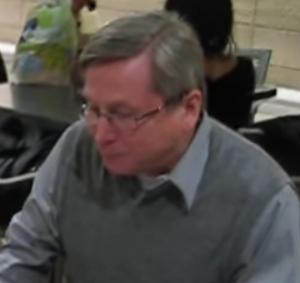
George "Checkercycle" Gerhauser
With permission
When I saw his channel grow in popularity and publish videos regularly, I was really happy to see it and I stopped producing. Flash forward to September 2019--- I noticed George had stopped publishing videos and there was a void in English checkers/draughts on YouTube. My checkers opening moves and best counter moves had nearly 500K views at the time, so I started producing videos diving deeper into openings, and the rest is history!
CM: About how many videos have you made? Do you have any favorites or ones you think are the best?
RP: I've made more than 125 videos dedicated to checkers, broken down into various categories such as Beginners, Openings, Tactics, etc. My tactical videos are far and away the most popular. Although they are not as popular, my favorite videos to create are famous games. I like providing historical context, and do my best to set the stage, so the viewers can understand the pressure and stakes. I like how the 1982 Masters Hallett-Tinsley, and 1955 Tinsley-Hellman videos turned out. I'd also like to give thanks to Mike Mitchell for creating the fun animation introduction in my videos.
CM: Do you intend to continue the series? What are your hopes for it? Do you have any sort of new or special content planned?
RP: My plan is to continue publishing videos geared toward helping beginners and anyone looking to improve in basic strategy and tactics. Alex Holmes and I have been collaborating from time to time, and I expect there may be some additional collaborations to come in the future, along with live stream events, including the 11-man ballot world championship match.
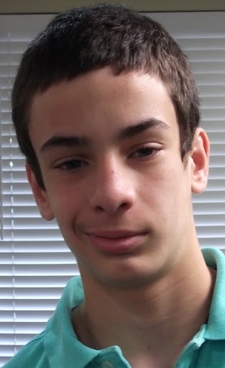
Alex Holmes
With permission
There is always something new to learn in checkers, and I feel the same way about the channel, which is why I am always interested in hearing feedback and criticism. So far, I've been fortunate in that the vast majority of the feedback I receive is very positive.
CM: What can be done to revive interest in checkers, especially among younger players?
RP: Something I've learned while making these videos is that checkers is far from extinct, and players of all ages truly enjoy playing the game and learning some things along the way. However, high level tournament checkers is a different story. Attending a tournament can be a fun and fulfilling experience, and I try to relay that in videos. While we are seeing a decline in the United States, there appears to be a revival in places such as Kenya, South Africa and Tanzania, which is amazing to see! Is it possible these videos will generate interest in checkers in other parts of the world, including the United States? Perhaps! For me, I just like giving back to the game that has given a lot to me, and continues to enrich my life.
CM: Anything you'd like to add?
RP: One of my all time favorite problems is Henderson's Shot, which you covered in a 2008 article. However, my favorite tactical theme is The Brooklyn, which can arise from many openings, as you pointed out in 2017. The tactic can also be found in my favorite unrestricted opening, the Waterloo. The run-up can be found in Lees' Guide, page 158, variation 1, with play credited to H.F. Shearer.
11-15 23-18 8-11 18-14 9x18 24-19 15x24 22x8 4-11 27x20 5-9 21-17 9-14 25-21 11-15 28-24 7-11 29-25 15-18 32-27 11-15 26-23 3-7 30-26 6-9; forms diagram.
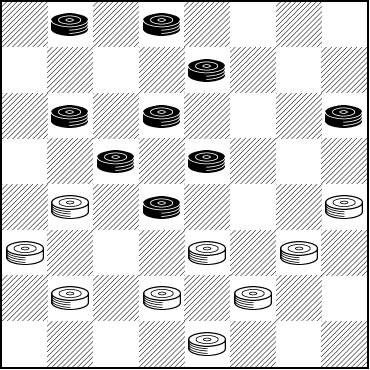
WHITE
White to Play and Draw
W:W17,20,21,23,24,25,26,27,31:B1,2,7,9,10,12,14,15,18
A fascinating interview and a classic problem. Expert players will likely be familiar with this one and know the solution offhand; the rest of us will have a bit of a challenge and some good instruction and entertainment. See how you do and then click on Read More to see the solution.![]()
You can email the Webmaster with your comments on this article.
17th Anniversary
Today marks the 17th anniversary for The Checker Maven. We celebrate 17 years of no-fail on-time weekly publication, something we once would have never thought possible. We reach thousands of checker fans and bring them a consistent message that checkers is challenging, fun, and as relevant today as it ever was.
Our success wouldn't have been possible without the support of our loyal readers, and we can't thank you enough. We once thought to stop publication after 10 years, and then 15, but your encouragement and support has led us to continue on. We can't say how long we'll continue as health and age are increasingly a factor, so let's just say that we look forward to providing more quality checker entertainment in the years to come.![]()
You can email the Webmaster with your comments on this article.
Prize Problem Now Offers $100
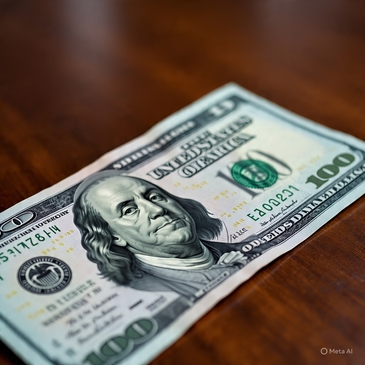
Brian Hinkle's Prize Problem has remained unsolved and now Brian has increased the prize to $100 as of 00:01 HST, August 1, 2021. The final deadline for the receipt of a correct solution is 00:01 HST, August 27, 2021. There will be no further prize increases and the solution and name of the winner (if any) will be published in The Checker Maven on August 28.
The problem has resisted the efforts of top players and strong computer programs. Brian has even asked to have a computer search done to an unprecedented level of a trillion positions.
But it can be solved. Will you be the one to do it?

Terms and conditions apply; see the Prize Problem article, linked above, for full details. Void where prohibited by law.![]()
You can email the Webmaster with your comments on this article.
Contest Prize Will Be $75
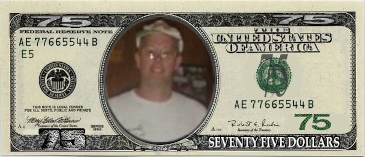
At 00:01 AM HST on July 1, 2021, the prize for solving Brian Hinkle's Prize Problem (see here) will increase to $75.
As of this writing, no one has claimed the prize so the field is wide open.
Give it your best and win some money!
Conditions and limitations apply. See contest article linked above. Void where prohibited by law
![]()
You can email the Webmaster with your comments on this article.
2021 ACF National: A Big Thank You
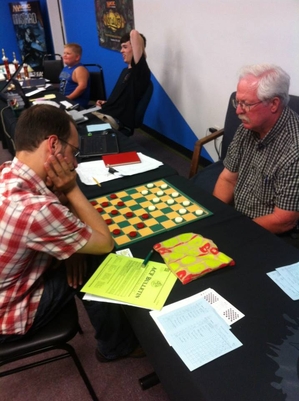
All images used with permission
After a year's hiatus due to the Coronavirus pandemic, the ACF National Tournament is slated to return in October, 2021, and it's all thanks to the efforts of Joe McDaniel and his family.
It's shaping up to be one of the great competitions of checker history with a prize fund of epic proportions, running into the tens of thousands of dollars.
The tournament will take place in Tulsa, Oklahoma, October 4-7, 2021. You can read full details in the tournament flyer by clicking here.
Mr. McDaniel granted The Checker Maven an interview, which we're pleased to publish today. Joe had the following opening comment.
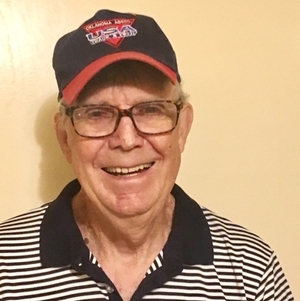
Joe McDaniel
"Since 1943 I have been fascinated by checkers. The fact that on the surface it appears to most everyone to be a simple game, for children and very old folks. This is one thing that intrigues me.
I am not a really good player. If I finish half way in the minors in a major tournament I am happy."
Well, Joe, we're not so sure about you being a "not really good" player, but here's the rest of the interview.
Q. After a year's hiatus due to Covid, the 2021 ACF National Tournament looks to be one of the most spectacular offerings in tournament history, with $32,000 in guaranteed prizes. How did this come about?
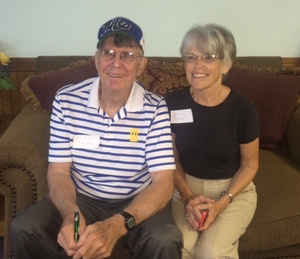
Mr. and Mrs. Joe McDaniel
A. Most of the prize money for the 2021 national tourney is from my wife and me. ACF will provide $9,000 and individual donations will be about $1,500. My sons have given $16,000.
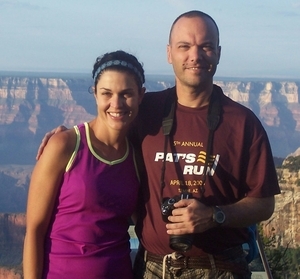
Danielle Winkler and David Seres
We are also giving $5,000 for the Kondlo/Bernini GAYP match which will happen right after the tourney. We will also give $4,500 for the World Qualifier here in Tulsa in November.
The total cost for the tourney and match will be about $47,000. This includes helping with the hotel rooms for several individuals. Also, the cost of entry fees and ACF membership will be around $3,000. Missouri Checker Association fees will be around $300.
The love of the game has motivated me to be the major sponsor.
Q. Tell us more about the decision to honor a great champion, Alex Moiseyev.

Alex Moiseyev
A. We believe Alex M. deserves to be the honoree based on his accomplishments. He is arguably the best player in the country.
Q. What do you expect to see in the way of participation? Do you anticipate much in the way of youthful contestants?
A. We had 56 players in the last national 3-move in Branson in 2015. Hopefully we can have the same number in Tulsa. We are personally contacting several young players.
Q. Do you expect any difficulties with Covid restrictions?
A. If Covid is still a threat we may have to postpone the tourney into 2022.
Q. How can the checker community help out with this tournament?
A. We are asking for contributions in the letter we have sent to over 100 players. If you wish to help with the prize fund, send your contribution to: 1416 S. Marion Ave., Tulsa, OK 74112. Make checks payable to Joe McDaniel. Contact okrunjoe@cox.net you have any questions.
Thanks, Joe, for this fascinating information, and for everything you do for the great game of checkers. We all look forward to this year's tournament.
We asked Joe for his favorite checker problem, and he mentioned one by grandmaster problemist Brian Hinkle that we've previously published. Rather than repeat that problem, Brian generously provided us with another of his sparkling compositions.
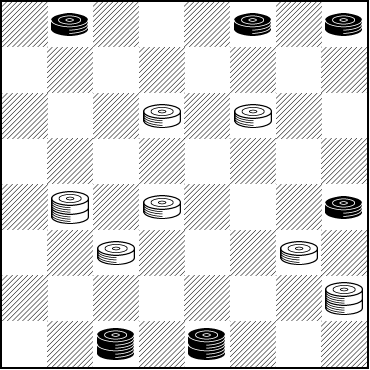
WHITE
White to Play and Win
W:W10,11,K17,18,22,24,K28:B1,3,4,20,K30,K31
Give this one a try and you'll understand why Joe picked one of Brian's problems as a favorite. When you're ready click on Read More to see the solution.![]()
You can email the Webmaster with your comments on this article.
Brian Ups the Stakes
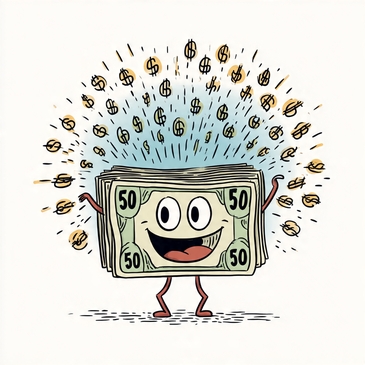
Brian Hinkle's Prize Problem hasn't been solved as of the date of publication, so he's upping the ante. As of 00:01 AM HST on June 1, the prize offer will increase to $50. Brian asks, "Are you a gambler?" In other words, do you submit your solution now, while the prize is still $25, or take the chance and wait for the $50 prize, knowing that someone else might solve it in the meantime? It's all up to you!
We won't be publishing the solution on June 4, as originally planned, to allow further time for someone to submit the winning solution. Good luck to one and all!![]()
See terms and conditions on the problem page linked above. Void where prohibited by law.
You can email the Webmaster with your comments on this article.
Host Migration Completed

Public Domain
We've just completed a transfer of our website hosting to a new hosting company. The old company, one we've been with for nearly 20 years, regrettably has suffered a deterioration in reliability and responsiveness. These things, combined with ever-increasing costs, told us it was unfortunately time to move on.
The transition was both expensive and time-consuming, occupying several marathon days and nights. We're still not certain that everything is back to 100% operation, so if you notice anything that seems wrong, please let us know. However, we're hoping for smooth sailing from here on out.![]()
You can email the Webmaster with your comments on this article.
Rebooting Checkers
Checkers is in need of a reboot. That's the opinion of Australian Richard Torning, and he has some original ideas about how to go about it.
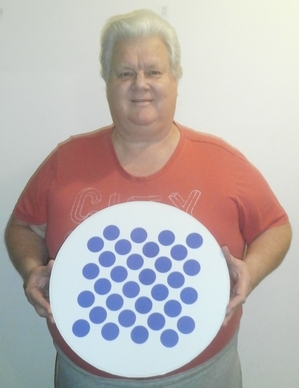
Richard Torning and "Roundsquare" Board
We can't argue with Mr. Torning's major premise. The fortunes of our game of checkers have been declining since the 1950s, when television became a big thing. You've heard it all before, about how the public considers checkers a game for kids and old men; that someone is playing "checkers" instead of "chess" when they need to up their game and move to a higher level; and the list goes on.
Mr. Torning wants to make the game more appealing, and to do so he's revived and modernized an idea that actually goes back more than 100 years but never really caught on: the "roundsquare" board. But instead of trying to fit a square peg into a round hole (or vice-versa), he's instead "circling the square" and the new board is just one part of a multi-pronged approach.
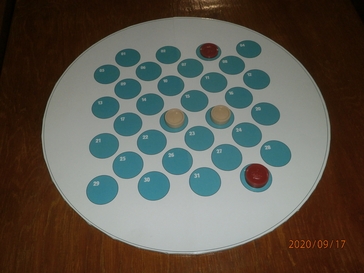
Numbered "Roundsquare" Board
We did an an-depth interview with Mr. Torning. You can read it all by clicking on Read More, just below the problem solution (please solve the problem first!), and we think you should. Mr. Torning has an insightful and appealing message for us. Not for him is yet another "modern" variant of the game that inevitably detracts rather than adds. His ideas are practical and cogent.
For one thing, he'd like to see a fresh start with the game renamed, and the name depending upon the language and usage of a particular area. He suggests Checkers-32 in the United States, Draughts-32 elsewhere in the English-speaking world, and so on, even going so far as to suggest a series of meaningful names to use among Aboriginal groups in Australia.
Of the "roundsquare" board, he says this: "The aim is to keep a minimalist approach to the game by further eliminating the 32 superfluous squares on the board but retaining the rules and shape of the two pieces. Instead of limiting the game to red/white or black/red pieces there is a need to make the game colorful, attractive, eye-catching, and simple to understand."
Mr. Torning's prototype boards are indeed very colorful and attractive and instantly attract attention. He also points out that using this board would uniquely differentiate our version of checkers from all others, and especially distance the game from chess.
Again, we urge you to read Mr. Torning's full remarks. He has also provided an interesting booklet, Early Australian Draughts Games, which you can download here.
The Draughts-32 idea is currently being prototyped at Minimbah Aboriginal School in Australia. Mr. Torning hopes to spread it far and wide and asks for your support by trying out the new board and the new ideas in your own checker playing community, and then becoming an ambassador.
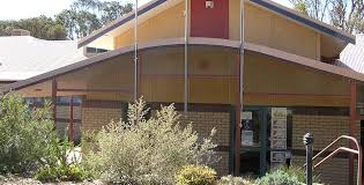
Building at Minimbah School
We can only wish Mr. Torning much success. Surely we would all like to see checkers have a vibrant and exciting future. Mr. Torning is working to make that happen.
And now, to "round" out today's column and "square" all accounts, here's a checker problem presented on a roundsquare board.
BLACK
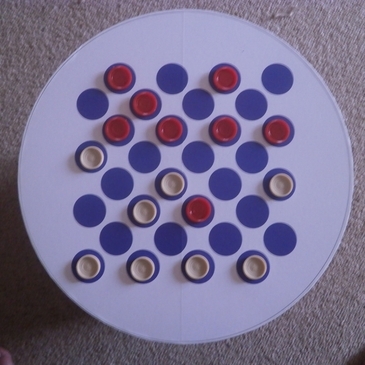
WHITE
White to Play and Win
W:W13,18,20,22,29,30,31,32:B1,3,6,9,10,11,12,23
See if you can get "round" to solving it, after which you can "square"-ly click your mouse on Read More to see the solution.![]()
You can email the Webmaster with your comments on this article.
Profile of a Checkerist: Anthony Bishop
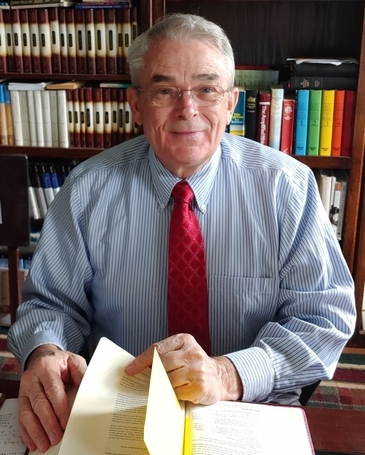
Anthony Bishop
Some years back we had the pleasure of meeting International Master Anthony Bishop, when he visited Hawai`i to take part in our one-time only, very small Hawai`i State Checkers Championship Tournament. Mr. Bishop won easily, of course, and landed the first prize of a $100 gift certificate from a local merchant. Gentleman that he is, Mr. Bishop turned around and gave his prize to a single mom who had taken part in the tournament. High principles and high quality of play are Mr. Bishop's hallmarks.
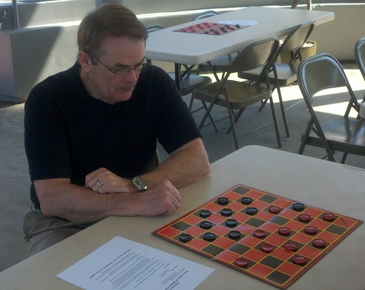
Mr. Bishop at the 2011 Hawai`i State Checkers Championship
You can read all about Anthony Bishop in his own words here. In a Saturday column we can only give a brief summary of the checker career of a remarkable man.
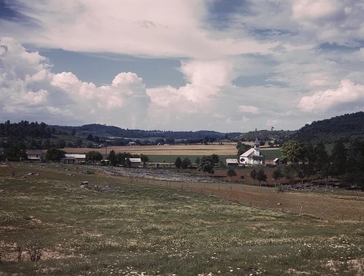
Rawpixel CC0
The town of Hickory Valley, Tennessee, where Mr. Bishop was born, may be small but it had an active and skilled checker playing community. Soon after he started playing, he made the acquaintance of a Tennessee grandmaster, Hugh Burton, a 38-time Tennessee State Champion. Mr. Burton became a lifelong friend and mentor.
Mr. Bishop started play towards the end of the Golden Age, and over the years made the acquaintance of all the greats: Tinsley, Long, Hellman, Lowder, Case, Banks, and many more. Mr. Bishop even worked for a while at Mr. Lowder's piano store as a piano salesman, remarking that with Elbert Lowder, there was never a dull moment.
Along with Mr. Lowder, one of the more interesting players Mr. Bishop ever met was Newell Banks, finding his skill and analysis abilities to be amazing.
Over the years, Mr. Bishop built up an outstanding checker library, eventually obtaining the collections of Arthur Reisman, Richard Fortman, Karl Albrecht, Hugh Burton, and Robert Shuffett.
Mr. Bishop views the 1978 publication of his extensive book The Encyclopedia of Checkers, to be his greatest contribution to the game. It's a book of photos and biographies of the checker greats.
He considers his highest playing achievements be consecutive wins in the 5th District Tournament over Hugh Burton and Lloyd Taylor in 1977, and over Lloyd Taylor in 1978. He has also competed in three international matches, obtaining excellent scores.
We asked Mr. Bishop for a favorite checker problem, and he offered this one by G. Slocum.
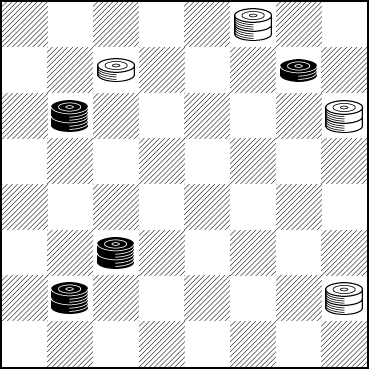
WHITE
White to Play and Win
W:WK3,6,K12,K28:B8,K9,K22,K25
Match wits with Mr. Bishop and Mr. Slocum and see if you can solve this amazing problem. You can check your work, as always, by clicking on Read More. ![]()
You can email the Webmaster with your comments on this article.
The Checker Maven is produced at editorial offices in Honolulu, Hawai`i, as a completely non-commercial public service from which no income is obtained or sought. Original material is Copyright © 2004-2026 Avi Gobbler Publishing. Other material is public domain, AI generated, as attributed, or licensed under CC1, CC2, CC3 or CC4 and the various CC options. Information presented on this site is offered as-is, at no cost, and bears no express or implied warranty as to accuracy or usability. You agree that you use such information entirely at your own risk. No liabilities of any kind under any legal theory whatsoever are accepted. The Checker Maven is dedicated to the memory of Mr. Bob Newell, Sr.
